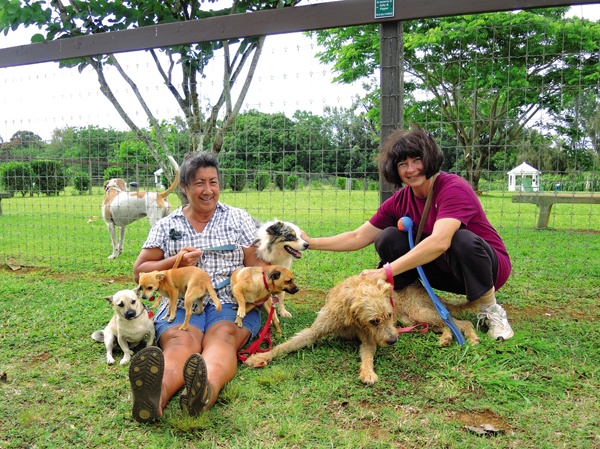LIHUE — A proposal to be introduced by the Kauai County Council Wednesday would mean a significant hike in dog-license fees — especially for owners of unneutered and unspayed dogs. The additional revenues would help the Kauai Humane Society maintain
LIHUE — A proposal to be introduced by the Kauai County Council Wednesday would mean a significant hike in dog-license fees — especially for owners of unneutered and unspayed dogs.
The additional revenues would help the Kauai Humane Society maintain the same services it provides the county, according to Councilman Tim Bynum, who introduced the bill by request. He said the bill was a suggestion of the nonprofit and has the support of the administration.
“The level of service they’ve been providing the county was much greater than what the county had been paying for, and they could not continue to have other funding sources subsidize the county’s responsibilities,” Bynum said.
Under Draft Bill 2490, a license would cost $50 for each unaltered or unspayed dog, and $15 for each altered dog. Currently, dog licenses are $6 for unaltered dogs, and $2 for altered dogs. Licenses are good for two years, and the proposal keeps the same time frame.
Hunters who hold a current hunting license pay $6 for the first hunting dog and $2 for each additional dog. The bill proposes to delete the entire paragraph that gives hunters this exemption. If it goes through unchanged, licensing for 20 unaltered hunting dogs would cost $1,000 rather than $44.
“That is the most likely controversial part of the bill,” Bynum said. “This in not my bill, it’s by request … I’m keeping an open mind.”
An additional $2 would be charged for a metal tag containing a serial number and the year for which the license was issued.
Kapaa resident Wanda Wong has four dogs, and she got all of them within one year. Each one is fixed. She said if people can’t afford to pay for the cost of having a dog, maybe they shouldn’t have one.
“To me, how I look at it is, how much do you want your dogs?” she said.
Bret Ramey of Kapaa owned pets for more than 20 years. He said he doesn’t own a dog, but occasionally takes care of his friend’s dog, Kainoa, a pure-bred golden retriever that came from a line of service dogs and is not fixed.
To Ramey, most responsible pet owners wouldn’t mind fees associated with food and health care. Just the leash he was holding, he said, cost about $25.
Lawai resident Joy Zepeda adopted Grace, a playful airedale mix, at KHS. She thinks that paying $15 for a two-year license is fair.
“I think it’s reasonable if the money is allotted totally for the Humane Society,” she said.
Last year, former KHS Executive Director Shannon Blizzard did not ask the council for an increase in their annual $660,000 in county funding, which caused the nonprofit an operational loss of about $333,000.
Blizzard said at that time she wanted to wait until she was on her position for a year before asking for more money.
Earlier this year, current KHS Executive Director Penny Cistaro, with only a few months on the job, asked the council for $973,000 in funding. Councilman Gary Hooser proposed giving KHS an additional $150,000 to make up for some of the funding gap.
Bynum said he supported Hooser’s proposal, but the council ultimately voted to increase KHS funding by about $100,000, bringing the county’s total funding to KHS to $770,000 per year.
Bynum said he doesn’t know how much these fee increases would bring to KHS, because he said he hasn’t had this discussion with them yet. But he said it’s his understanding KHS has not yet signed a contract with the county for next fiscal year, which starts July 1.
“They’re waiting for this bill, because they’re not going to agree to that level of services without these fee increases,” he said.
Under the new proposal, each dog without a license, running at large, found on public property or “upon any unfenced lot” or not in a sufficient enclosure, “whether in the immediate presence of the owner or otherwise,” would be taken to KHS.
The penalties for an offense would range from $20 to $65, depending on the status of the license, if the dog is unaltered and the number of offenses.
Upon seizure, a dog would be kept by KHS until the owner would pay for the dog license and the penalties, but for no more than 48 hours. After that period, the dog could be sold for the equivalent of a dog license and the penalties, or “as much more as can be obtained therefore provided that the officer may neuter or require the neutering of the dog prior to sale.”
Adding to all those fees, impoundment fees are $12 per day.
If the dog is not sold, “it should be humanely destroyed,” the bill states.
The license fees would go to the county. All other fees go to the Humane Society.
Bill 2490 is on the council’s agenda for Wednesday’s meeting starting at 9 a.m. at the Historic County Building in Lihue.
• Léo Azambuja, staff writer, can be reached at 245-0452 or lazambuja@thegardenisland.com


